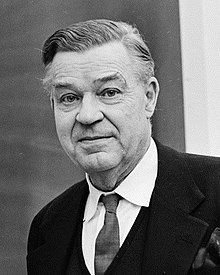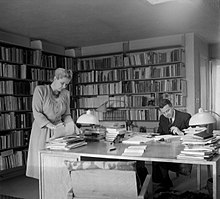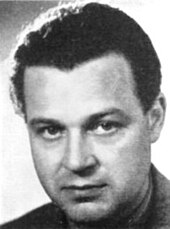Gunnar Myrdal
Gunnar Myrdal [ ˌgɵnːaɹ ˈmyːɖɑːl ] (born December 6, 1898 in Gustafs , † May 17, 1987 in Stockholm ) was a Swedish economist . From 1947 to 1957 he was the first head of the UN Economic Commission for Europe . In 1974, together with Friedrich August von Hayek , he was awarded the Alfred Nobel Memorial Prize for Economics for pioneering work in the field of money and business cycle theory and the analysis of the relationship between economic, social and institutional phenomena .
Life

Myrdal, whose family has Finnish roots, was the son of a railway designer. After graduating from high school, Myrdal studied law. In 1924 he married Alva , b. Reimer. With her he had two daughters and a son (later the writer Jan Myrdal ).
At the request of his wife Alva, Gunnar Myrdal completed studies in economics , sociology and finance . He finished his studies in finance in 1927 with a doctorate as Dr. oec. In his dissertation he practiced primarily critical of the labor theory of value of Karl Marx .
Then Myrdal worked as a lecturer. From 1933 to 1950 he was professor of economic policy and finance at the Stockholm School of Commerce . In 1937 the architect Sven Markelius built a house for the Myrdal family: the "Villa Myrdal" in Stockholm's Bromma district .
Myrdal always rejected Marxism , but was a staunch socialist . As such, he and his wife had been a member of the Social Democratic Workers' Party since 1932 . From 1934 to 1938 and 1944 to 1947 Myrdal represented his party in the first chamber of the Swedish Reichstag .
From 1945 to 1947 Myrdal was a member of the Swedish government as Minister of Commerce. Here he was responsible for a trade agreement with the Soviet Union and a coal agreement with Poland . The agreement with the Soviet Union in particular was very controversial among the population. In connection with the Swedish currency crisis, Myrdal resigned from his offices in 1947.
From 1947 to 1957, Myrdal was the first head of the UN Economic Commission for Europe . In 1958 he was elected to the American Academy of Arts and Sciences , 1974 to the British Academy and 1982 to the American Philosophical Society .
In 1960 Myrdal went back to Stockholm University . There he held the Chair of International Economic Policy until his retirement in 1967.
Myrdal died on May 17, 1987 in Stockholm at the age of 88.
plant
With his wife Alva, Gunnar Myrdal wrote the book The Crisis in the Population Question (Swedish: Kris i befolkningsfrågan , 1934), which inspired the then Swedish Minister for Social Affairs, Gustav Möller, to introduce social assistance for families. In the book they also called for a sterilization program so that "highly unfit for life" individuals do not reproduce and social welfare does not become unaffordable.
From 1938 on, Gunnar Myrdal directed a comprehensive socio-economic, anthropological, and legal study of racial relations in the United States, sponsored by the Carnegie Corporation . The result was Myrdal's best-known work An American Dilemma: The Negro Problem and Modern Democracy (1944, co-authors: RME Sterner and Arnold Rose). In it he describes the problem of racial relations as a dilemma that arises from the conflict between the lofty ideals of the “American dream” on the one hand and its imperfect realization on the other. In the generations since the American Civil War 1861–1865 , the United States had been unable to implement its human rights ideals for the African-American tenth of the population. The book became the basis of the 1954 decision by the US Supreme Court (" Brown v. Board of Education ") that racial segregation was illegal in public schools.
Myrdal was a sharp critic of neoclassical theories and related theories of economics. He criticized their deductively derived equilibrium models because of their lack of reality and their function to justify social inequality: the idea of an “original equilibrium” that can be disturbed, but which arouses opposing forces that in turn tend towards equilibrium. A common formulation is that of the “ invisible hand ” of the market , which can remove imbalances, for example between developing and industrialized countries . In his book Economic Theory and Underdeveloped Regions (1957), Myrdal contrasts these equilibrium models with a polarization-theoretical hypothesis: that of the spiraling, cumulative causation of imbalances in economic development. The smallest advantages or disadvantages of certain regions can grow in the course of time to great advantages or disadvantages compared to other regions, as long as the "free play of forces", ie the state unregulated market, prevails. Therefore, Myrdal advocated state interventions, including on an international level, to maintain public welfare. He is considered one of the pioneers in development policy .
Awards
- 1970: Peace Prize of the German Book Trade , together with his wife Alva Myrdal
- 1974: Alfred Nobel Memorial Prize for Economics , together with Friedrich Hayek
- 1981: Nehru Prize for International Understanding
Publications
- The political element in national-economic doctrine formation. 1932.
- Zeitschrift für Nationalökonomie, Volume IV, Issue 3 (1933) The end-means-thinking in economics
- The Political Element in the Development of Economic Theory. 1959.
- The Cost of Living in Sweden, 1830-1930. 1933.
- Crisis in the Population Question. 1934.
- Fiscal Policy in the Business Cycle. The American Economic Review. vol 21, no 1, Mar 1939.
- Population, a Problem for Democracy. Harvard University Press, 1940.
- Contact With America. 1941.
- An American Dilemma: The Negro Problem and Modern Democracy. Harper & Bros., 1944 ( InternetArchive BookReader ).
- Social Trends in America and Strategic Approaches to the Negro Problem. In: Phylon. Vol. 9, No. 3, 3rd Quarter, 1948.
- Conference of the British Sociological Association, 1953. II Opening Address: The Relation between Social Theory and Social Policy. In: The British Journal of Sociology. Vol. 4, No. 3, Sept. 1953.
- An International Economy, Problems and Prospects. Harper & Brothers Publishers, 1956.
- Rich Lands and Poor. 1957.
- Economic Theory and Underdeveloped Regions , Gerald Duckworth, 1957.
- Value in Social Theory: A Selection of Essays on Methodology. Ed. Paul Streeten, published by Harper, 1958.
- Beyond the Welfare State. Yale University Press, 1960.
- Challenge to Affluence. Random House, 1963.
- America and Vietnam - Transition. No. 3, Oct, 1967.
- Twenty Years of the United Nations Economic Commission for Europe. In: International Organization. Vol 22, No. 3, Summer, 1968.
- Asian Drama: An Inquiry into the Poverty of Nations.
- Objectivity in Social Research. 1969.
- The Challenge of World Poverty: A World Anti-Poverty Program in Outline. 1970.
- Against the Stream.
- Hur Styrs Lands? 1982.
- Gunnar Myrdal on Population Policy in the Underdeveloped World. In: Population and Development Review. Vol 13, No. 3, Sept. 1987.
- The Equality Issue in World Development. In: The American Economic Review. vol 79, no 6, Dec 1989.
See also
literature
- Örjan Appelqvist: Gunnar Myrdal i svensk politics 1943–1947 - En svensk Roosevelt and hans vantolkade nederlag. In: NORDEUROPAforum. 1, 1999, pp. 33-51. ( online ).
- Thomas Etzemüller: "The Romanticism of Rationality". Alva & Gunnar Myrdal - Social Engineering in Sweden. Transcript Verlag, Bielefeld 2010, ISBN 978-3-8376-1270-7 .
Web links
- Literature by and about Gunnar Myrdal in the catalog of the German National Library
- Newspaper article about Gunnar Myrdal in the press kit of the 20th century of the ZBW - Leibniz Information Center for Economics .
- Information from the Nobel Foundation on the 1974 award ceremony for Gunnar Myrdal
- Biography at Munzinger
- Gunnar Myrdal - "Die Zeit" online from May 22, 1987
Individual evidence
- ^ Bank of Sweden : The Sveriges Riksbank Prize in Economic Sciences in Memory of Alfred Nobel 1974. 1974, accessed January 6, 2012 .
- ↑ Örjan Appelqvist: Gunnar Myrdal i svensk politik 1943–1947 - En svensk Roosevelt and hans vantolkade nederlag. In: NORTHERN EUROPE forum . 1, 1999, pp. 33-51 ( online ).
- ↑ Member History: Gunnar Myrdal. American Philosophical Society, accessed February 4, 2019 .
- ^ Franz Walter: Social Democratic Genetics. In: The time. August 31, 2010.
- ↑ Ann-Judith Rabenschlag: For a better 'population quality' A comparison of population policy concepts in Sweden 1920–1940.
- ^ Peace Prize 1970: Alva and Gunnar Myrdal friedenspreis-des-deutschen-buchhandels.de
| personal data | |
|---|---|
| SURNAME | Myrdal, Gunnar |
| ALTERNATIVE NAMES | Myrdal, Karl Gunnar |
| BRIEF DESCRIPTION | Swedish economist |
| DATE OF BIRTH | December 6, 1898 |
| PLACE OF BIRTH | Gustafs |
| DATE OF DEATH | May 17, 1987 |
| Place of death | Stockholm |



